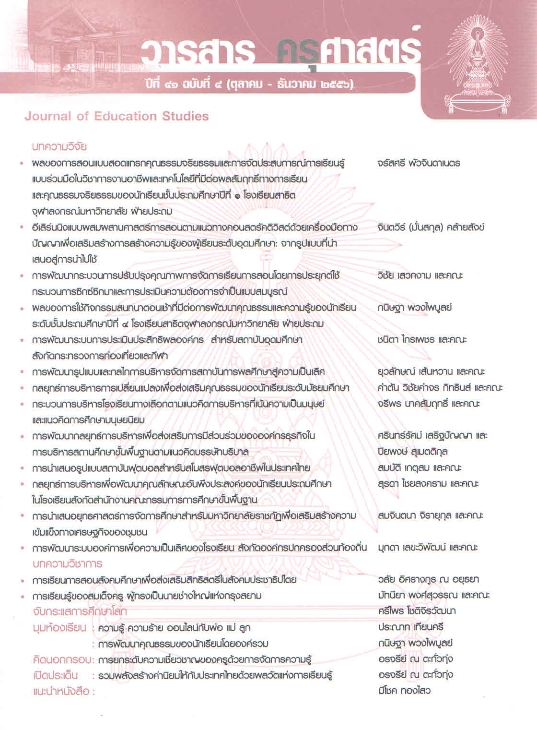ผลของการสอนแบบสอดแทรกคุณธรรมจริยธรรมและการจัดประสบการณ์การเรียนรู้แบบร่วมมือในวิชาการงานอาชีพและเทคโนโลยีที่มีต่อผลสัมฤทธิ์ทางการเรียน และคุณธรรมจริยธรรมของนักเรียนชั้นประถมศึกษาปีที่ ๑ โรงเรียนสาธิตจุฬาลงกรณ์มหาวิทยาลัย ฝ่ายประถม
Abstract
วัตถุประสงค์ของการวิจัยนี้ เพื่อศึกษาระดับผลสัมฤทธิ์ทางการเรียนและคุณธรรมจริยธรรม จากการจัดการเรียนการสอนวิชาการงานอาชีพและเทคโนโลยี โดยแบ่งออกเป็น ๓ แบบ ดังนี้ (๑) สอด แทรกคุณธรรมจริยธรรม (๒) จัดประสบการณ์การเรียนรู้แบบร่วมมือ และ (๓) ร่วมกันระหว่างการสอด แทรกคุณธรรมจริยธรรมและจัดประสบการณ์การเรียนรู้แบบร่วมมือของนักเรียนชั้นประถมศึกษาปีที่ ๑ โรงเรียนสาธิตจุฬาลงกรณ์มหาวิทยาลัย ฝ่ายประถม ภาคต้น ปีการศึกษา ๒๕๕๑ จำแนกห้องเรียนที่มีผล คะแนนทดสอบพื้นความรู้ก่อนทดลอง (Pre-test) ออกเป็นกลุ่ม คือ (๑) ห้องเรียนที่มีคะแนนฯ แจกแจง แบบปกติที่มีค่าเฉลี่ยและความแปรปรวนไม่แตกต่างกัน ซึ่งมี จำนวน ๔ ห้องเรียน สุ่มตัวอย่าง ๑ ห้องต่อ แบบวิธีการสอน (๒) ห้องเรียนที่มีคะแนนฯ แจกแจงแบบไม่ใช่แบบปกติ และมีค่ามัธยฐานแตกต่างกัน ๓ ห้องเรียน และ (๓) ห้องเรียนทั้งระดับรวม ๗ ห้องเรียน ใช้เวลาการสอนทั้งหมด ๑๕ สัปดาห์ ประเมิน ผลคุณธรรมจริยธรรมและทักษะการปฏิบัติงานทุกสัปดาห์ สอบวัดความรู้ความเข้าใจในสัปดาห์ที่ ๙ และ ๑๕ สุดท้ายทดสอบพื้นความรู้หลังการทดลอง (Post-test)
ผลการศึกษา ได้แสดงผลชัดเจนว่า วิธีการสอนแบบจัดประสบการณ์การเรียนรู้แบบร่วมมือ ให้คะแนนในทุกด้านสูงที่สุด ได้แก่ คุณธรรมจริยธรรม ทักษะการปฏิบัติงาน และความรู้ความเข้าใจ นอกจากนี้ ยังพบว่า การให้กำลังใจและการชมจากครู ประกอบกับเทคนิคการเล่านิทานจะช่วยกระตุ้นให้ นักเรียนโดยเฉพาะในวัยนี้เกิดความสนใจและมีสมาธิได้อย่างดี แต่ครูต้องระวังเรื่องข้อจำกัดของเวลาที่มีอยู่ ดังนั้น หากมีการจัดสรรเวลาที่เหมาะสมและนิทานที่เข้ากับบทเรียนได้ดี วิธีการสอนแบบ สอดแทรกคุณธรรมจริยธรรมโดยใช้การจัดประสบการณ์การเรียนรู้แบบร่วมมือจะเป็นรูปแบบการสอน ที่ดีเยี่ยมสำหรับวิชาการงานอาชีพและเทคโนโลยีกับนักเรียนระดับชั้นประถมศึกษาปีที่ ๑ และผลที่ได้จาก การจัดการเรียนการสอนดังกล่าว ทำ ให้ผู้เรียนมีการพัฒนาเป็นลำ ดับในหลายด้าน โดยเฉพาะการมีแนวคิด ใหม่ๆ มีความรับผิดชอบ มีระเบียบวินัย มีความคิดสร้างสรรค์ และมีขั้นตอนในการทำงานดีขึ้นเป็นลำดับ
This research aimed to investigate the academic achievements and moral virtue in the course of occupational work and technology instructed by (1) integrating moral virtue; (2) cooperative learning experience management; and (3) cooperative methods between (1) and (2) for the 1st level students of Chulalongkorn University Elementary Demonstration School during the 1st semester of year 2008. The study classified the classrooms into 3 groups based on the pre-test result of the course knowledge as (1) the classrooms having the pre-test scores as a normal distribution, equal means and variances, having 4 classrooms and sampling 1 classroom per instruction; (2) the classrooms having the scores as non normal distribution, unequal medians, having 3 classrooms, and (3) all the classrooms in the level being 7-classrooms were considered. The instructions were performed for 15 weeks. The moral virtue and working skills during the experiment in each week were evaluated. The exams of knowledge and understanding were performed in the 9th and the 15th weeks. Finally, the post-test was applied.
The study results showed that the cooperative learning experience management could remarkably provide the best achievements including moral virtue, working skills, and knowledge and understanding; moreover it was found that encouragement and admiration of teachers including storytelling techniques could stimulate the students. The children have particularly good attention and concentration, however the teacher much be careful about limiting the duration of class. If the suitable time and the concerned storytelling with the lesson were allocated, the cooperative methods between the integrating moral virtue and the cooperative learning experience management could be the excellent for the course of occupational work and technology with the 1st level students. The effects of the method mentioned showed that the learners were improving in various directions, especially in new ideas, responsibilities, self-discipline, creative thinking, and planning steps of working.




